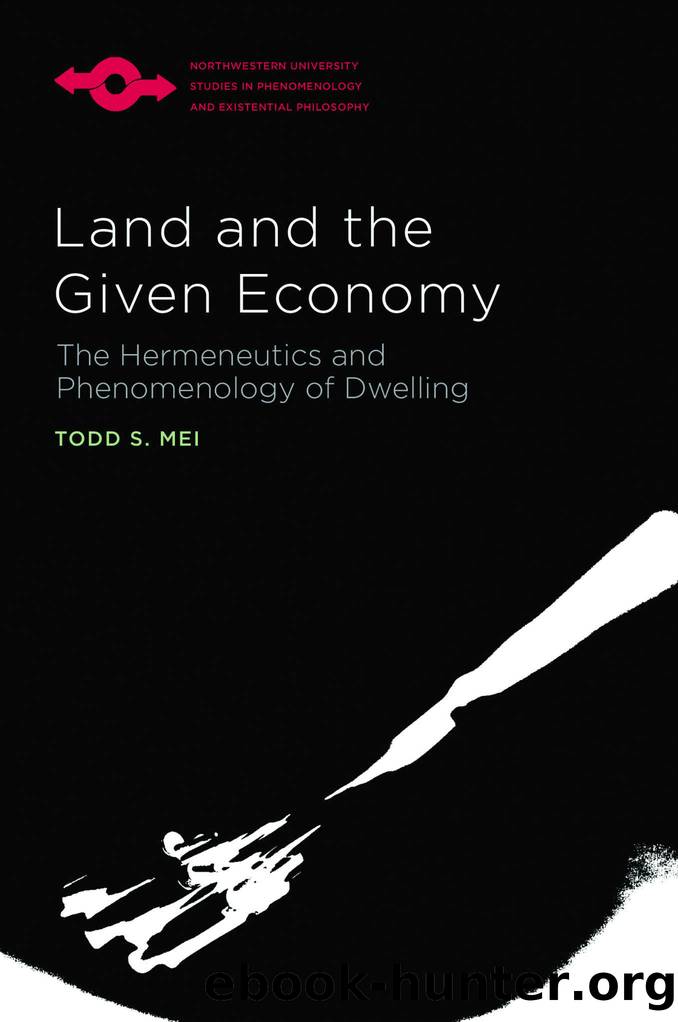Land and the Given Economy: The Hermeneutics and Phenomenology of Dwelling by Mei Todd S

Author:Mei, Todd S.
Language: eng
Format: epub
Tags: BUS069030 Business & Economics / Economics / Theory, PHI000000 Philosophy / General, PHI018000 Philosophy / Movements / Phenomenology
ISBN: 9780810134089
Publisher: Northwestern University Press
Published: 2017-01-15T00:00:00+00:00
Land as Hupokeimenon, or the Subject of Concealing
If concealment is the expression of the limitations of finitude according to which things that arise in being return to earth in their perishing, this passing away according to the ordinance of time is not absent a relation to land. If the facticity of being-landed is not simply a feature of our biological existence, then the meaning of land according to the conditions of finitude cannot be reduced to the observation that in our death we return to the earth in some form. Land is integral to the manner in which we come to terms with finitude and so cannot be simply a site on which our mortality comes to an end and returns to the material from which we arose. In this section I want to take up Heideggerâs notion of concealment as sheltering in order to examine how land plays a role in a general historical unfolding of being itself and our human being. I should clarify here that in speaking of being itself and human being together, I am assuming an interpretation of Heideggerâs thought in which although being itself is ontologically primary, a mutual dependence between the two exists. This mutuality can be expressed as the primary unity of being itself in differentiation through those beings who take the meaning of being to be its concern. In other words, though in and a part of being itself, we differentiate it through our activities of thought and building.53
To recall, I defined sheltering as the way earth allows itself to be rendered; and as a result of donating itself as substance and material, it instills a life limited according to the conditions of finitude and the dependence on earth. These conditions are those in which a certain law-like governance plays itself out, or what are the consequences arising from the ways we engage with being. We saw earlier how poetic dwelling is for Heidegger an existence that lives in appropriate relation to being and earth understood as phusis and ground. With land we can understand sheltering in terms of the kind of building and cultivation that might perpetuate remembrance of earth and the question of being.54 Equally important, nonetheless, and perhaps more illustrative of my thesis, are negative instances where a form of land usage perpetuates our forgetting and so results in a disruption of sheltering. That is to say, because we have an inappropriate relation to land, its sheltering power is distorted. We are in some sense homeless.55 Specifically, in what follows I will highlight how our current use of land underwrites a respective form of dwelling that forgets our dependence. Furthermore, this oblivion can be understood as homelessness in both the strict sense of not having a home and a figurative sense of a mode of existing that is unfit because it relates inappropriately to land.
If forgetting abandons the question of being itself for beings, then one would expect to find in a state of homelessness a type of objectification of land that ignores its manner of being.
Download
This site does not store any files on its server. We only index and link to content provided by other sites. Please contact the content providers to delete copyright contents if any and email us, we'll remove relevant links or contents immediately.
Zero to IPO: Over $1 Trillion of Actionable Advice from the World's Most Successful Entrepreneurs by Frederic Kerrest(4529)
Machine Learning at Scale with H2O by Gregory Keys | David Whiting(4296)
Never by Ken Follett(3937)
Harry Potter and the Goblet Of Fire by J.K. Rowling(3848)
Ogilvy on Advertising by David Ogilvy(3608)
Shadow of Night by Deborah Harkness(3361)
The Man Who Died Twice by Richard Osman(3072)
Book of Life by Deborah Harkness(2933)
The Tipping Point by Malcolm Gladwell(2914)
Will by Will Smith(2911)
0041152001443424520 .pdf by Unknown(2843)
Purple Hibiscus by Chimamanda Ngozi Adichie(2828)
My Brilliant Friend by Elena Ferrante(2824)
How Proust Can Change Your Life by Alain De Botton(2807)
How to Pay Zero Taxes, 2018 by Jeff A. Schnepper(2646)
Hooked: A Dark, Contemporary Romance (Never After Series) by Emily McIntire(2551)
Rationality by Steven Pinker(2352)
Can't Hurt Me: Master Your Mind and Defy the Odds - Clean Edition by David Goggins(2324)
Borders by unknow(2304)
